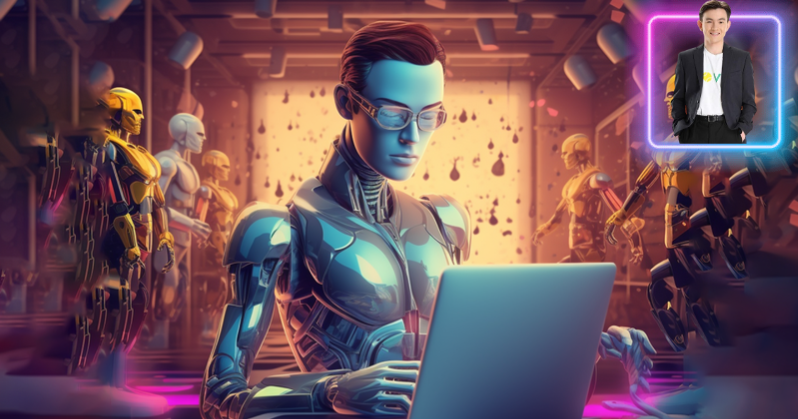This is a guest post by Richard Armstrong who is an early stage investor in many startups in both SE Asia and globally. Plus Richard has cofounded several companies.
Guest Author: Richard Armstrong
The entertainment industry is one of the most interesting areas I’ve been spending some time in lately. And it has been undergoing a pretty remarkable transformation due to advances in AI.
AI is revolutionizing content creation, distribution, and consumption across various sectors, including filmmaking, streaming, music production, gaming, and media analytics.
As these technologies evolve, they offer new creative possibilities and efficiencies while also presenting some interesting problems and dilemmas.

Film
AI’s impact on filmmaking is pretty broad… enhancing both pre-production and post-production processes.
For instance, AI algorithms assist in script analysis, casting, and visual effects (VFX).
These technologies can predict audience reactions to scripts, suggest improvements, and match actors to roles based on detailed analyses of past performances.
Imagine knowing that the film is going to be a blockbuster even before you film it. This would change the movie industry more than perhaps anything in history.

Also on the visual side… it’s commonplace these days to see amazing scenes that are completely generated by a computer and look real. AI is playing a very powerful role in generating realistic scenes and characters, significantly reducing the time and cost involved in creating lifelike CGI elements.
This not only improves cost, but also expands what you can do. For example interactive films. You already see a bit of this on Netflix where you can choose between several choices of what happens next… but it’s honestly quite limited. Because everything needs to be filmed in advance.
But imagine if AI could just come up with the content on the fly. You’d have true interactive films that have an infinite set of ways that the story can play out. Just like in real life!

Streaming
Streaming platforms like Netflix and Amazon Prime are leveraging AI to personalize viewing experiences.
By analyzing users’ viewing habits, AI algorithms recommend content tailored to individual preferences. Ever wonder why your Netflix home screen looks completely different from someone else’s?
It’s because they’re using the hundreds of shows and films that you watched to judge pretty accurately what you are likely to want to view next.
And this helps these platforms manage their libraries more effectively because they know exactly what content to produce more of.
Netflix even uses AI to offer dynamic thumbnails and descriptions that entice specific viewers. Are you a sucker for thumbnails with people smiling? Don’t be surprised if Netflix is already capitalizing on this.

Content creation
Beyond curation, AI is also making strides in content creation. AI-driven tools can compose music, write scripts, and create short videos.
This democratizes content production, allowing creators with limited resources to produce high-quality material at a fraction of the usual cost.
For example, AI can generate background music for films or suggest plot twists, opening new creative avenues for writers and directors.
Will a day come when you can produce your own film on your computer with no budget and then get millions of views? Absolutely!
It’s already happened on Youtube with user generated content… but now you’ll be doing your own Disney-like films if you want.

Making music
In music production, AI algorithms can compose music and enhance production by suggesting chord progressions and melodies.
Tools like Amper Music and AIVA create original compositions based on user inputs, providing valuable resources for musicians looking to innovate.
AI also assists in mastering tracks, ensuring optimal sound quality and consistency across albums, thus pushing the boundaries of what’s possible in music creation.

Video editing
High quality video editing is becoming more accessible with AI-powered tools.
These software options can automatically cut and edit footage, match music to scenes, and adapt the editing pace to the desired mood, significantly reducing post-production time.
For instance, Adobe Premiere Pro’s Sensei AI can analyze video content and make intelligent editing suggestions, from color correction to scene transitions.
This automation allows editors to focus on the creative aspects of their work rather than technical details, streamlining the production process.

Gaming
AI’s role in gaming is transformative, creating more immersive experiences.
It enhances non-player character (NPC) behavior, procedural content generation, and dynamic storytelling. Games like “The Last of Us Part II” use advanced AI to develop realistic NPC behaviors, making interactions more engaging.
Entire game worlds can be tailored to the individual user with AI now, offering endless unique gaming experiences and the ability for a game to ‘never end.’ Which I think is pretty damn cool.

Wrapping up
Incorporating AI into the entertainment industry is about reimagining what entertainment even is, not just adopting new technologies.
A lot of the old boundaries that limited what a game or a movie could be… just don’t exist anymore.
And as AI advances, we will likely see a new era of entertainment that is more interactive, personalized, and, possibly, more human than ever before. I’m really fascinated and excited to see how these technologies continue to evolve and shape our experiences.









